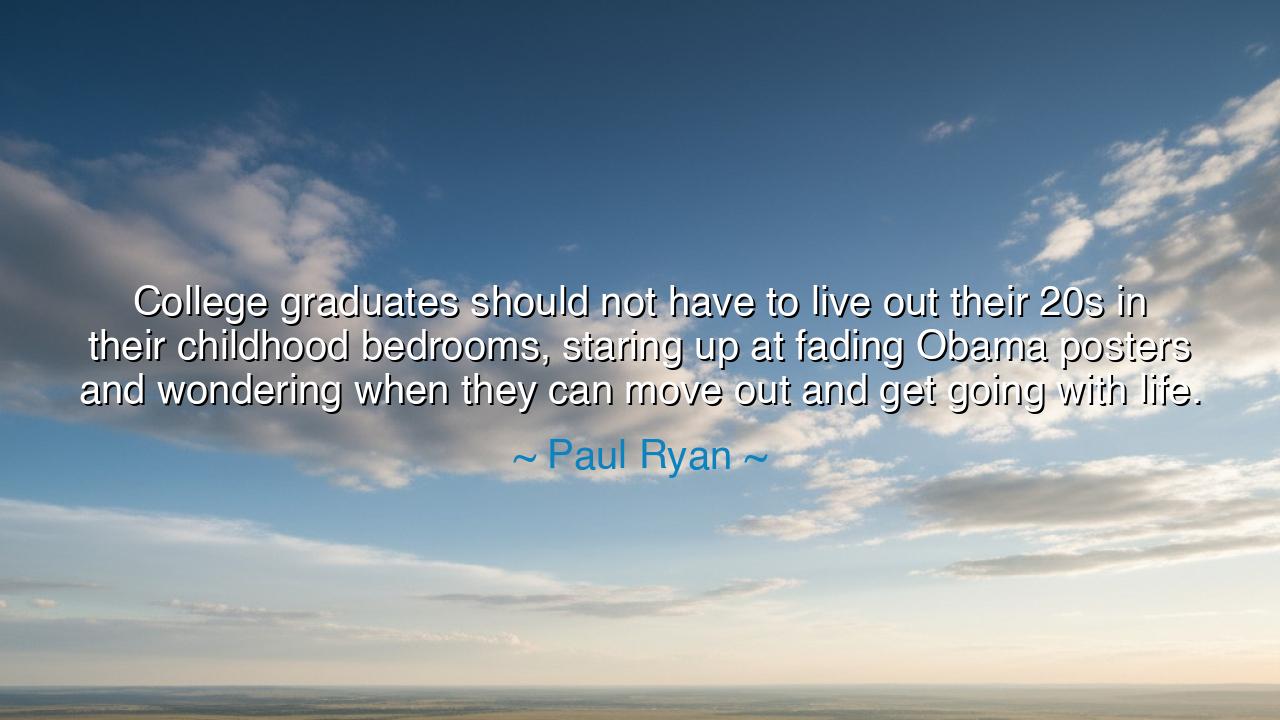
College graduates should not have to live out their 20s in their
College graduates should not have to live out their 20s in their childhood bedrooms, staring up at fading Obama posters and wondering when they can move out and get going with life.






The words “College graduates should not have to live out their 20s in their childhood bedrooms, staring up at fading Obama posters and wondering when they can move out and get going with life” spoken by Paul Ryan carry the weight of both social observation and moral urging. Beneath their rhetorical phrasing lies a profound truth about the transition from youth to independence, the challenges of economic and personal freedom, and the desire for purpose that defines early adulthood. Ryan’s statement reminds us that education alone does not secure autonomy, and that society must provide opportunities for young adults to step fully into life, to claim both responsibility and dignity.
In the style of the ancients, we might liken this reflection to the admonitions of Cicero or Seneca, who emphasized the importance of self-sufficiency and the cultivation of one’s own household and destiny. To remain trapped in the safety and familiarity of a childhood home is to stall the soul’s journey toward maturity. The posters on the walls — symbols of past ideals and youthful allegiance — fade with time, yet the young adult remains, wondering when they can truly exercise the virtues and ambitions for which they were educated. Ryan speaks to the tension between potential and circumstance, urging both society and the individual to bridge the gap.
The origin of this insight lies in the economic and social realities of modern America, where rising costs of housing, stagnant wages, and student debt make independent living a formidable challenge. Yet Ryan frames it not only as an economic matter, but as a moral and psychological one. The passage from adolescence into adulthood should be marked by self-determination, responsibility, and engagement with the wider world. To remain in the bedroom of one’s youth is not merely a logistical inconvenience; it is a symbol of unfulfilled purpose, delayed ambition, and the postponed exercise of freedom.
History offers parallels for this modern observation. Consider Alexander the Great, who at a young age was entrusted with command and responsibility, leaving the tutelage of his father and teachers to seize his own destiny. The world recognized the necessity of stepping into one’s role, of claiming independence and authority early. Those who hesitate or remain shielded from responsibility may delay not only their own growth but the realization of their potential. Ryan’s words echo this principle: youth is the time to act, to move, to engage, not merely to linger in nostalgia or dependency.
Yet there is also compassion embedded in the quote. Ryan does not blame the graduates themselves; he implicitly acknowledges the structural forces — economic, cultural, political — that constrain them. The fading posters are a metaphor for a world of promise that has not yet been fully realized. Like a warrior who prepares for battle but must wait for the gates to open, the young adult longs to step into the arena. The lesson is that both society and individuals must work together to create conditions that allow education to translate into independence and purposeful engagement.
Consider, too, the story of Benjamin Franklin, who at a young age left his family home, apprenticed in printing, and began a path of self-determination that would eventually transform a nation. Franklin did not linger in comfort; he took action, sought opportunity, and embraced responsibility. His example mirrors Ryan’s point: education without autonomy is incomplete, and personal growth requires both courage and opportunity. To linger too long in the safe confines of one’s childhood home is to delay the heroic journey that defines early adulthood.
Dear listener, the lesson is clear: do not wait for circumstances to force your independence — claim it actively. Seek employment, pursue opportunities, embrace responsibility, and engage fully with the wider world. The world is both teacher and stage, and your twenties are the time to practice mastery over your own life. To remain passive is to defer growth; to act with initiative is to accelerate it.
Finally, let Paul Ryan’s words serve as both warning and inspiration: honor your education by living independently, exercising judgment, and pursuing purpose. Remove the faded posters of the past not in haste, but in readiness for the life that awaits beyond the walls of childhood. Take the lessons learned, the knowledge gained, and step boldly into the world. For it is in the act of leaving the familiar, of assuming responsibility, and of shaping one’s own path, that adulthood — and true freedom — is realized.






AAdministratorAdministrator
Welcome, honored guests. Please leave a comment, we will respond soon